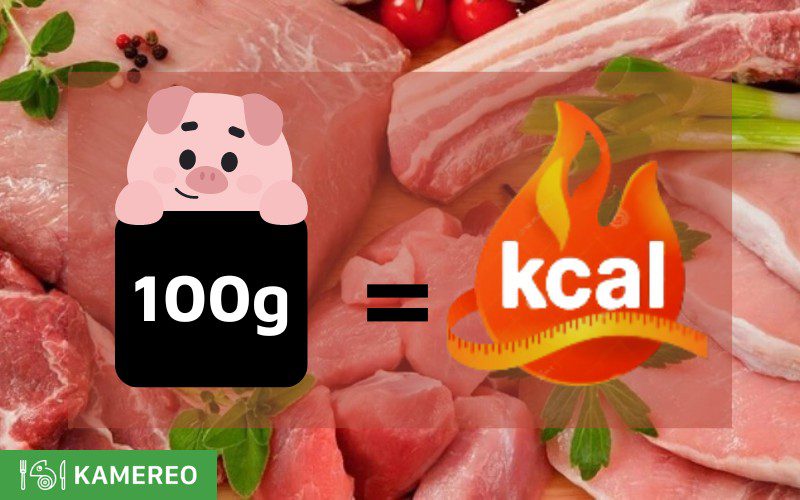Pork is classified as white meat – one of the protein-rich food sources widely consumed in many countries. However, excessive consumption of this type of meat can lead to weight gain. Let’s explore with Kamereo how many calories are in 100g of pork to build a suitable diet!
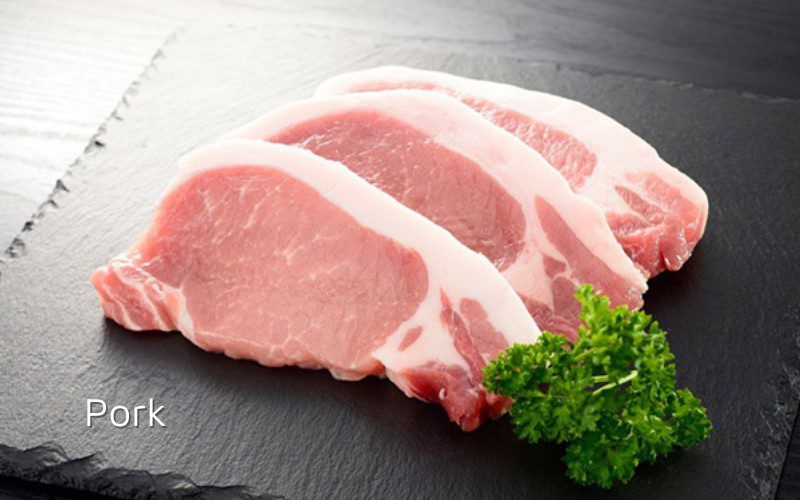
How many calories are in 100g of pork?
According to the USDA, 100g of pork contains about 242.1 calories with 27.34g of protein and 17.04g of fat. Additionally, pork provides many essential vitamins and minerals such as: 2mcg vitamin A, 0.3mg vitamin C, 25mg calcium, 351mg potassium, and 1.09mg iron.
Moreover, the calorie content of pork varies depending on the specific cooking method:
- A piece of medium-rare pork: 239 calories
- 100g of cooked ground pork: 296.4 calories
- 100g of grilled pork (with lean and fat): 211.7 calories
- 100g of grilled lean pork: 164.7 calories
- 100g of breaded and fried lean and fat pork: 303.5 calories
- 100g of pork sausage: 324.7 calories
- A piece of medium-cooked bacon: 37 calories
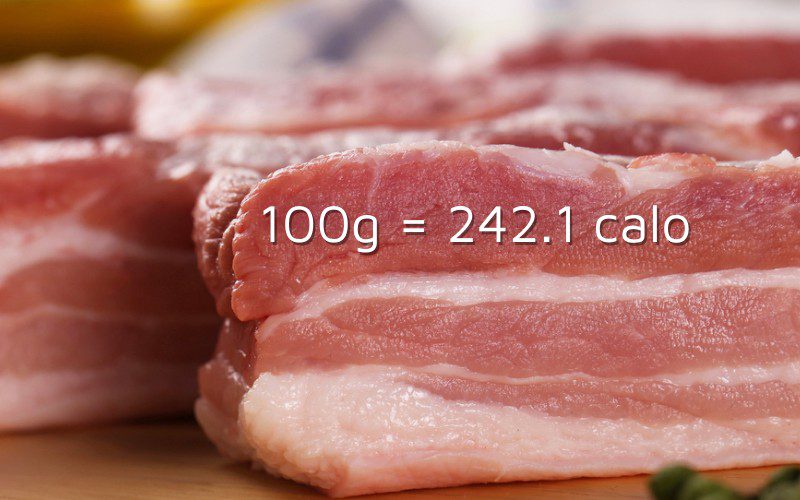
Nutritional value of pork
According to nutrition experts, pork is benign for health and less allergenic compared to beef. This type of meat contains many nutrients such as:
- Protein: Contains all 9 essential amino acids that help muscle growth. Lean pork has the highest protein content, up to 89%.
- Fat: The fat content in pork varies by part, ranging from 10 to 16%. However, pork contains less conjugated linoleic acid (CLA) than beef.
- Vitamin B1: Supports the metabolism of sugars and starch into energy. Additionally, vitamin B1 protects the brain and cardiovascular health.
- Vitamin B12: Contributes to blood formation and brain function.
- Vitamin B6: Participates in the formation of red blood cells.
- Vitamin B3: Important for growth and metabolic activity.
- Selenium: The quality of selenium in pork is equivalent to seafood, eggs, and dairy products. Selenium stimulates and enhances immune function.
- Zinc: Helps improve brain health and the immune system.
- Phosphorus: Essential for body growth and health maintenance.
- Creatine: Provides energy and supports muscle development, beneficial for bodybuilders.
- Taurine: Supports heart and muscle function.
- Glutathione: Acts as an antioxidant, helping maintain health.
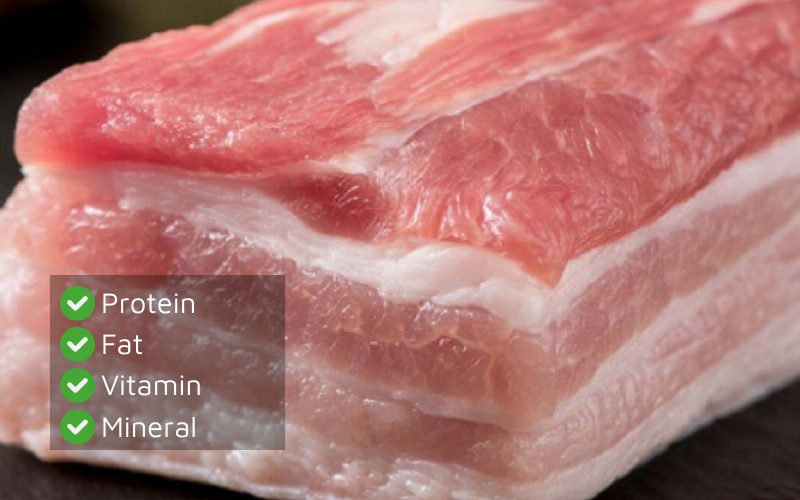
Is eating pork good for you?
With its high nutritional content, eating pork offers many health benefits. Some notable benefits include:
- Maintaining muscle mass: A protein-rich diet helps prevent muscle decline and Sarcopenia, common in older adults. Additionally, pork supports recovery, development, and maintenance of muscle mass.
- Improving exercise performance: Creatine, beta-alanine, and taurine in pork help improve muscle function and physical performance.
- Supporting cell development and activity: Vitamins B1, B3, B2, and B6 in pork help provide energy to the body. Particularly, this group of B vitamins supports the nervous system, brain function, hormone production, red blood cell production, and DNA repair.
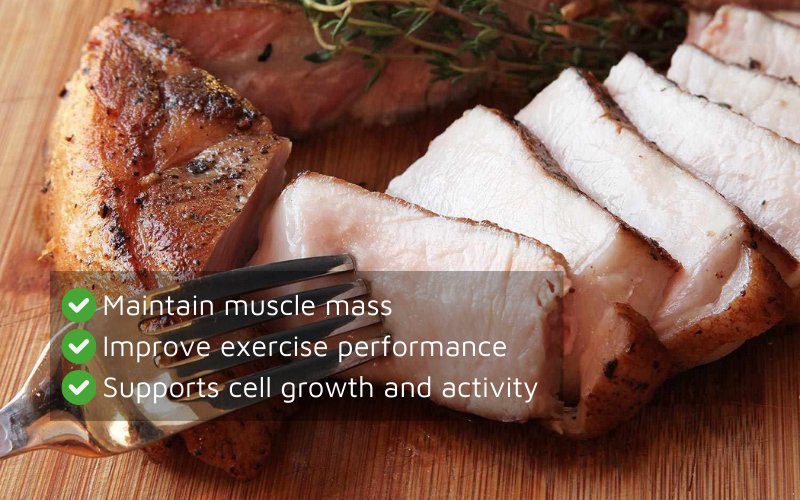
Notes when eating pork
Although pork has many health benefits, consuming it raw or undercooked can have negative health effects. Additionally, you may face parasitic infections such as:
- Pork tapeworm: Causes epilepsy, also known as Cysticercosis.
- Roundworm parasites: Belonging to the Trichinella family, causing Trichinosis with symptoms ranging from mild (stomach pain, diarrhea, heartburn, nausea, muscle pain, fever, eye swelling, and weakness) to fatal.
- Toxoplasmosis: A parasitic protozoan that causes infections and can affect the immune system.
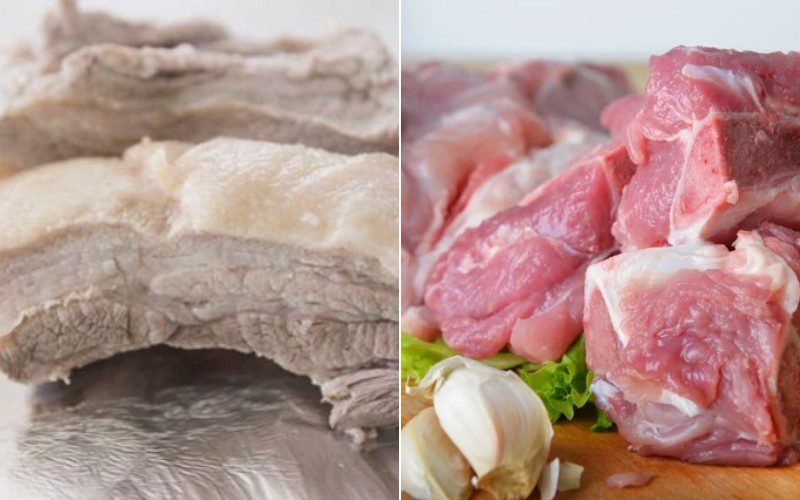
How to choose good, safe pork
Choosing good, clean pork helps ensure delicious flavors and maintains high nutritional content. You can apply the following tips to choose the best piece of meat:
- Color: Choose meat with a pale red or pinkish color, bright, and interspersed with ivory-white fat.
- Smell: Smell to check for the characteristic meat smell. Avoid pieces with strange or unpleasant odors.
- Elasticity: Press the meat to check its elasticity. Fresh meat will be elastic, not mushy, and not overly watery.
- Fat layer: If choosing a fatty part, select a fat layer about one and a half fingers thick. Also, check the meat texture to avoid pieces that separate between the fat and meat parts.
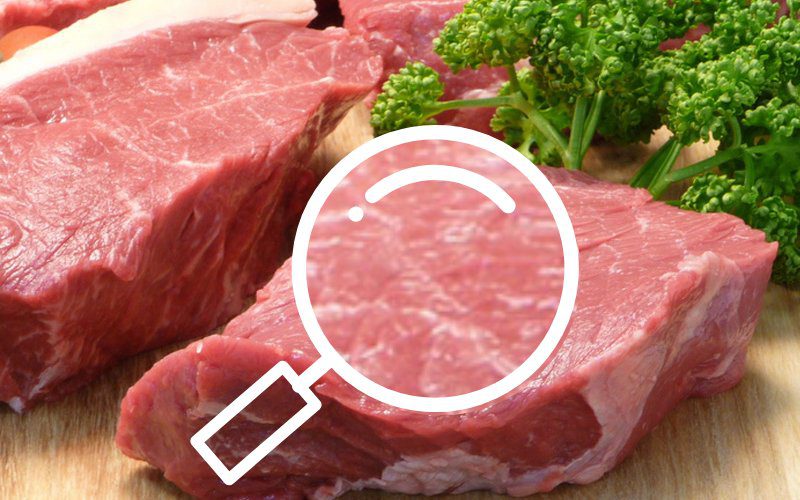
How to store pork
You need to store pork properly to ensure quality and prevent spoilage. Depending on your usage needs, you can apply one of the following two storage methods:
Method 1: Store in the refrigerator
- Sort and divide pork into appropriate amounts.
- Wrap the meat in cling film or place it in a food container.
- Store in the refrigerator’s cooler section for 2 to 4 days.
- Store in the freezer or freezer compartment, pork can be stored for over 6 months.

Method 2: Store at room temperature
Only store pork at room temperature for about 3 to 5 hours. You can apply the following methods:
- Rinse the meat with vinegar and wrap it tightly with a vinegar-soaked cloth.
- Spread honey evenly over the pork surface after rinsing.
- Apply salt evenly on the pork after rinsing.
- Ensure these methods to store pork safely and maintain food quality.
Conclusion
Hopefully, this article helps you answer the question of how many calories are in 100g of pork. Understanding this information helps you build a scientific diet, ensuring good health maintenance. Follow the Food and Life section to learn more useful information in daily life.
Read more:



